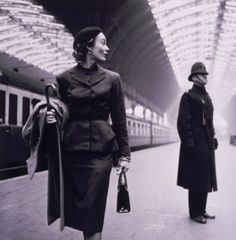My husband often laughs at the quantity of post-it slips that protrude from the pages of my ‘current reads’. Persephone books seem to attract more than most. I defend my use of them on the grounds that they are useful pointers to sentences, paragraphs that strike me as particularly significant: character, plot, style, wit, narrative themes – any of these can earn a sticker, as can a passage that is, quite simply, beautifully written. My copy of Every Eye already bristling like a hedgehog with little yellow tags, attracts more at each re-read and I have to accept that my husband’s gentle mockery has some foundation. But then I would argue that Every Eye is so rich and so complex, that barely a sentence is wasted, some only revealing their full meaning at second or third reading, others, multi-faceted, suggesting a quite different meaning on re-reading.

Every Eye charts two journeys, one moving in real time and covering perhaps two weeks, the other a journey already taken, and covering twenty-five years, the two converging at the last page, converging but not concluding. Thirty nine year old Hatty and her husband Stephen, younger by many years (his exact age is one of many things that we do not know about him) take a belated honeymoon to Ibiza, ‘the most savage of the Balearic islands’. The journey takes three or four days.

As trains and taxis and ferries move them forward, Hatty looks back at episodes in her life, directly or indirectly connected to her relationship with her aunt by marriage, Cynthia, whose death ‘at the Ipswich County Hospital, just after a cup of tea’, opens the book. We will learn a lot about Cynthia, but not the cause of her death, her age, nor how she happened to spend her last hours in Ipswich County Hospital. And yet from the two wholly ordinary details, and perhaps because of their very ordinariness, we can summon up the scene, from the high ceilinged ward, down to the drab formica bedside locker, and the green ribbed, NHS issue, tea-cup.
She has a sharp eye for surface detail, but Hatty was born with a squint, ‘her right eye turned … fatalistically towards the blind wall of a sharp nose’. Cynthia’s friend Jasper, Hatty’s first, elderly, lover, pays for the operation that her mother cannot, or will not, afford, but while surgery can straighten her eyes, it cannot alter her vision. Stephen is right when he says ‘I don’t believe you ever see anything dead on, only at a peculiar angle through the corner of your eye’. To see the world as it is requires more than correctly aligned eyes and Hatty knows that her vision is flawed at a far deeper, moral level, ‘one is born with one’s infirmities … one must carry them always regardless of their visible absence.’ Sight is perhaps not in the gift of men.

Stephen sees what Hatty cannot. She approaches Paris for the first time, anxiously looking not for what is new but, insecurely, for similarities to what she already knows, so that for her the suburbs seem as frayed and dingy as the approach to Euston or King’s Cross. He, knowing Paris, meets it afresh with his eyes closed, thrilling at the smell of the gasworks, the stinking tunnel, the breeze over the reservoir. He can rely on his inner eye, just as he relies on his inner ear to hear Hatty’s unspoken words, ‘running them together like dropped stitches along a needle’. Looking to the future he can reassure her that one day she will see and be able to accept the past for what it was, and scanning that past with the clarity of one who did not live it, he is able to offer an interpretation not far removed from the truth.

Of Hatty’s early years we learn only what she tells us: a thin, flat-chested child, sickly enough to have needed a lengthy dose of Breton sea air, sallow skinned, with dull brown hair, whose musical gift, which might have been her salvation, ‘had gradually shown itself to be uncoordinated and intermittent, like a small jewel that has always been hopelessly flawed’. About the rest of her family we know few facts. Her mother impoverished, cool, and controlling, with thinly cut nostrils, disapproves of her sister-in-law, one of the people in this world ‘who do not know the ropes’. Handsome Uncle Otway is inappropriately, and unhelpfully attentive: over-affectionate, but dismissive of his niece’s musical ambitions. Her father, dead, once, serving in the Indian Army, shot a tiger, the splayed skin on the sitting room floor being all that remains of either of them. Hatty recalls that he ‘had had a strong will and the brutalityto lay waste any small efforts of survival that did not amount to complete independence’. There seems to have been little warmth even in her young life. Apart from Cynthia’s rabidly political and self-absorbed son, all those closest to Hatty show varying degrees of cruelty towards her.
Little wonder that she reaches the age of twenty-five certain that she ‘could never successfully make a real contact with another being’, and falls, awkwardly, into the arms of Jasper, the enigmatic traveller, apparently an old family friend, but of whom she knows little and discovers not much more. Has he ever been married? Does he even like women? Why is Cynthia so unkind about him? Always ready to conjecture about strangers, Hatty asks few questions of those closest to her, and offers few details.
And there are no clues either as to what Cynthia, or for that matter Hatty herself, has been doing in the years between their estrangement and Hatty’s marriage to Stephen. We know more about the girl on the train to Barcelona, in her pink waterproof jacket,returning home from a year as an au pair in Preston. Isobel English writes as a watercolourist might paint, paper left blank containing as much information as the small, brightly coloured incidental figures in the background. And no-one has as much ‘white’ around him as Stephen. He rescues Hatty from herself, and proves a strong and perceptive companion at every stage of the journey, and yet we know next to nothing about him. He is wise and he is pragmatic, but who is he?
Isobel English is sparing with her details for at one level this complex novella is a mystery story, not resolved until the final page, when the past catches up with the present and the two journeys meet. In ‘real time’, Hatty and Stephen will make the return journey and continue their marriage (or maybe not) altered by what they have seen; Hatty’s personal journey through her own past must begin again in the light of what she has learned. ‘Life is lived forwards but understood backwards’, writes Neville Braybrooke in his preface.
But there is a third journey braided into the plait. Braybrooke makes it quite clear that there is a religious dimension to the novel. Before I opened the book and saw the lines from Auden facing the opening page, the two word phrase of the title had been echoing in my head. Why was it familiar? I found myself humming a hymn tune: was that the reference? ‘Lo He comes with clouds descending’ – the second verse starts Every eye shall now behold Him/Robed in dreadful majesty, based on words from the opening chapter of the Book of Revelation. Auden’s collection ‘Another Time’, from which the epigraph is taken, dates from the period of his re-christianisation: it is hard not to believe that he was unfamiliar with that verse. With so many references to dark and light, English will surely have had in mind the famous verses from St Paul’s letter to the Corinthians For now we see through a glass, darkly, but then face to face.
On two occasions she makes direct reference to the Seven Last Words of Christ on the Cross, which, Braybrooke confirms, held a profound resonance for her. Traditionally the last five sayings represent: Relationship, Abandonment, Distress, Triumph and Reunion. Is it too far-fetched to suggest that one of the many possible readings of Every Eye is one in which Hatty’s journey takes her past these mileposts, until she is able to say, in words that recall Saul’s experience on the Road to Damascus, ‘I feel a curious sensation, as if my eyes were peeled of scales; I feel receptive and calm, stronger than I have ever felt before.’

Quotes ….. do share your favourites
“To never have the exact knowledge of one’s position is the predicament of human frailty. Compassless, to see the beckoning lights, one advances to find that there is nothing there but a reflection in the deep-rooted blackness.”
“It must have been her peak period. People sometimes go through their whole lives without ever reaching the moment when they are exactly the person they want to be.”
“Nothing is ever lost that is begun, no word spoken that can ever be broken down to unco-ordinated syllables, no tear shed that will leave only a powdering of white salt. Everything must go on, and on, and on, repeating itself and gathering force for the ever that is still only the bright whiteness of eternity meditated on by mystics and recluses.”
and questions
What are we to make of Jasper’s apparent appearance at Cynthia’s funeral? What are we meant to understand by the final sentence of the novel?
Why did no-one tell Hatty about Jasper’s past? Is Stephen right when he says that “Cynthia at the time of the trouble was all for maintaining a family front”.
Stephen is a mysterious character. Who is he? Is there any significance in the fact that his mother sends a wreath to Cynthia’ funeral?
If you have enjoyed this book, you might also enjoy:
Consequences by E.M.Delafield (Persephone Book No 13)
Hetty Dorval by Ethel Wilson (Persephone Book No 58)
They Were Sisters by Dorothy Whipple (Persephone Book No 56)
Princes in the Land by Joanna Cannan (Persephone Book No 63)
What other bloggers have said about this book:
Every Eve has equally fine observations on place and character. Hatty finds a wry comfort in learning that an acquaintance with whom she has little in common will attend a family party. ‘At least we had the barren fields of our incompatibility between us, which made us better than strangers’ she reflects in a phrase that might have come from Elinor Dashwood. When she begins to date men at last, Hatty feels a slight thrill at ‘the almost human expression of the hard blocked toe-caps of their shoes’ with their requisite perforations.
Critics have compared English to Muriel Spark and Anita Brookner – both of whom admired her work – but she is less austere than Spark and takes more risks than Brookner. English has a voice all her own, and it is more interesting than that of many better-known writers. oneminutebookreviews
I find that many novellas sneak up on me: I spend the first 50 or even 75 pages feeling underwhelmed, struggling against the compression of the form, and just when I’ve got into the rhythm of the language and begun to be truly invested in the characters…the thing is over. Such was certainly the case with Isobel English’s 1956 novella, Every Eye. English writes with a careful precision that at first struck me as cold and unapproachable, but later came to seem like a perfect, unassuming vessel for the voice of her main character. She portrays an almost unbridgeable distance between humans, which at first appeared to be a lack of character development, but gradually revealed itself as a conscious philosophical – or at least psychological – stance, a portrait of the protagonist Hatty’s lived reality. As I turned the final page, I ended up feeling that somehow, while I wasn’t paying close enough attention, English’s narrative had grown and ripened into itself, filling completely the space it had made. eveningallafternoon
4 replies on “Persephone Book No.18: Every Eye by Isobel English”
Favourite quotes?
‘one is born with one’s infirmities and […] one must carry them always regardless of their visible absence.’ I certainly feel that to be true in terms of self-confidence, etc.
‘I don’t know what it is that gives to a day the quality of uplift and exaltation. It is perhaps to do with colour or wind or sound that penetrates and stirs the brown depths of the imagination and clears it for receptiveness.’
‘ultimately it is only the absence of things [. . .] that we notice; daily acceptance blunts the sensibilities as surfeit clogs the imagination.’
Reaction to book?
The language and structure has the concision of a poem and felt unsatisfactory and too much like hard work for the most part, but it flowered, and flowed, towards the end. I only finished it this morning and am already experiencing the resonances and feel that re-reading it will repay the effort – and that it will not, in fact, require an effort to do so.
Fun quote from the book: “So there was Ted then, . . . at least we had the barren fields of our incompatibility between us, which made us better than strangers.”
Fun new term for me” In vino caritas. (In wine there is charity.)
I found “Every Eye” difficult to read. The narrative reminded me of a dream state, with detailed scene descriptions and an equally ambiguous overall story line.
I found it helpful to focus on the religious allegory: Hatty was well on her way to becoming the perfect non-person until she was introduced by Cynthia (the evangelist?) to the Father-figure, Lomax. He, in turn, healed her infirmity and restored her vision. Hatty had a Baptismal reverie as she returned to St. Polignac-sur-mer (“They say that death by drowning is the least violent of ends . . . It is the bringing back to life that is more terrible . . . I walked back into this fabric of extreme youth . . .”). Later she wrote to her mother that “I feel . . . as if I was beginning my life all over again with a second chance . . .” Finally, Hatty had her epiphany at the hermit’s shrine.
There was a darker, creepier thread running through this narrative. The “violent intrusions” of Uncle Otway’s “heavy breathing” and “thickly furred hand” as the 12-year-old Hatty tried to play the piano stayed with me throughout the novel. Hattie’s reaction to Jasper’s “Call me Jassie” was equally disturbing (“This, I remember, was a shock, . . . It made me . . . pull at the rumpled skirt of my dress and drag it further down over my bare knees.”) And often, Hatty’s mother was warning her that all men are alike and not to be trusted.
I looked up the name “Lomax.” Among its variants are Loomis and Lumos. As we know from JKR, “lumos” is Latin for light or illumination. I don’t know what Isobel English may have meant by Jasper, but it is an Americanism for an ordinary guy.
This is as far as I could take my understanding of the book. I still don’t understand Cynthia’s story, and probably never will.
I read Every Eye twice, the first time enjoying the author’s narrative style and the second time mulling over the vagaries of the plot. Isobel English writes clearly and concisely, and has a gift for pithy description. It would be difficult to conjure up a more unattractive portrait than that of Ted ‘He was very small and did not believe in personal hygiene, or laying down his life for his fellow men.’ I enjoyed many passages in the book where the author shows the same power of sharp observation. ‘So often this is the way with solitary Englishwomen of character who retire abroad: they harden like the autumnal beads at their throat into hard little wax pellets that no one will ever heat again, they turn into a self-supporting wholesome substance that can never take anything in, nor be taken in, again.’
Although Neville Braybrooke provides a helpful synopsis of the plot in the Introduction, the reader is left with many unanswered questions. What happened to Cynthia’s child? Did Jasper attend Cynthia’s funeral in spite of being officially bedridden? In the final paragraph whose love ‘dura après la mort?’ Is this Jasper’s ghostly presence again? In spite of the religious references I don’t feel Hatty’s progress is really a spiritual journey – her reflections seem to me to be more of an exercise in memory and in reconciling the past with the present. The subtleties of this intriguing plot and the relationships of the main characters are very open to debate, while bearing in mind Stephen’s advice to Hatty ‘You must accept that it is impossible for you to ever divorce the facts of reality from imaginative interpretation; they have become too entwined.’
I’m interested by the comment by ‘eveningallafternoon’ that describes ‘Every Eye’ as a book that slowly creeps up on one. I’ve loved every Persephone book I’ve read so far, and I’m surprised to find myself struggling rather with this one, perhaps because I find Hatty so unsympathetic. But it is an elegantly written novel, and the obliquity of the narrative is clearly reflected in the title, with its reference to Hatty’s physical ‘eye’ problem, which is also symbolic. I’m still only half way through the book, having been seduced by a Barbara Comyns novel that arrived from the library for me, but I will return to ‘Every Eye’ and its perplexities as I have faith that a Persephone book can never let me down!